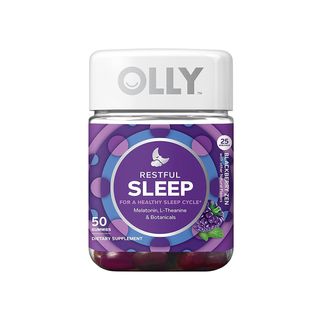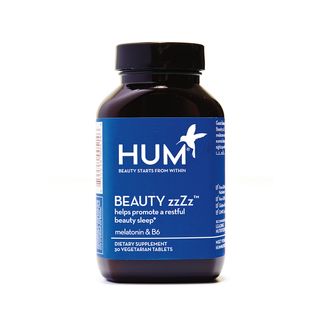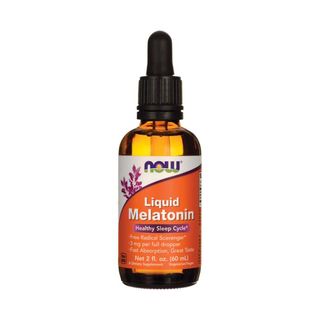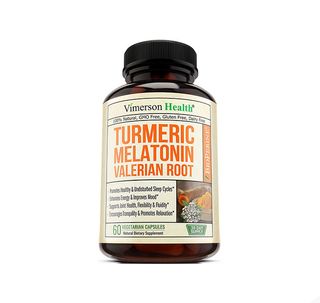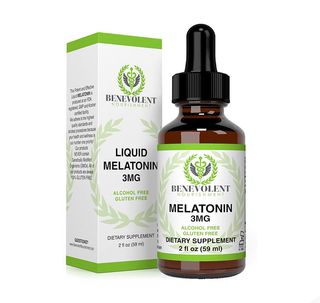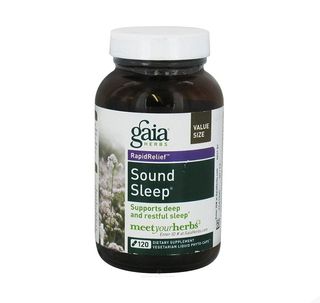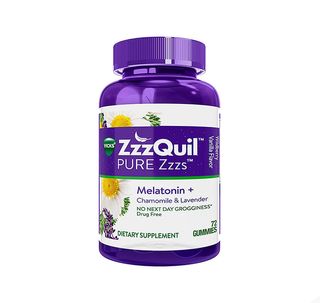Is It Bad to Take Melatonin? We Asked a Holistic Wellness Expert and a Physician

Sleep is always a hot topic here at the Who What Wear office. Mostly because we don't get enough of it—whoops. So while it's our natural tendency to sink our teeth into buzzy new products that make us feel like less of the vampires we apparently are, we've been putting more effort recently into discovering new ways to actually load up on the real stuff—from researching the best herbs for sleeping to updating our sleep space, we're determined. Thus, it was only a matter of time before melatonin (widely considered to be a more natural sleep aid option in comparison to other OTC options) came into the mix. However, just because a supplement is deemed more natural, doesn't necessarily mean it's 100% safe. (Please, just as you would with any type of medication, always check with your go-to physician before trying any new supplements—regardless of their touted health benefits.) Our ultimate question: Is melatonin bad for you in any way?
Since we're by no means experts on the subject, we called in two women who are: neuroscientist and holistic wellness expert Leigh Winters and Mia Finkelston, MD, a board-certified family physician who treats patients virtually via telehealth app LiveHealth Online. So how did they answer when we asked whether or not melatonin is bad for you? Read on for their expert opinions on the debate.
First, What Is Melatonin?

"Melatonin is a hormone that is produced by the pineal gland (a small gland that is located in the brain), and it helps to regulate our sleep cycle," explains Finkelston. (So while the majority of the population may think "pill" when the topic of melatonin comes up, that's just the commercial form of the hormone.) Essentially, levels of the hormone naturally vary throughout the day—rising in the evening approximately two hours before bedtime and ultimately putting people into a state of quiet wakefulness that can help promote sleep.
So what's happening in the brain when we take a dose of melatonin? According to Winters, melatonin activates either the MT1 or MT2 receptors in the brain, which ultimately trigger our internal clock to want to sleep sooner rather than later. And while taking melatonin as a sleep aid may sound like a foolproof tactic, as always, it's important to be informed on all fronts.
Is Melatonin Safe?

I asked both Finkelston and Winters point-blank if melatonin is bad for you, and here's exactly what they said. (Don't worry, for the most part, the outlook is optimistic!)
"Since melatonin is something that our bodies produce naturally, most professionals consider it to be a safe option. I recommend trying it for a few weeks (to essentially train your body when it needs to go to sleep each night), but more studies do need to be conducted to conclude its safety over a longer duration of time. I always recommend talking to your healthcare provider directly to find out if taking melatonin is right for you," Finkelston confirms.
And Winters agrees: "If you have trouble sleeping, there's clinical evidence demonstrating that short-term use of melatonin is not only effective but also safe in improving sleep quality, daytime alertness, and time it takes to actually fall asleep, which scientists refer to as sleep latency." The key takeaway here: short-term use.
Case in point, there are some potential risk factors to consider. "In general, it is not recommended that those under 20 years old use melatonin, as it can exacerbate seizure disorders, impaired liver function, and depression. Plus, it should not be used in those who are pregnant or breastfeeding, and it can interact with some blood pressure medications. If you are unsure or suffer from any of the above conditions, it's always best to consult your doctor before beginning a melatonin regimen," Finkelston says.
What Are the Side Effects?

If taken in the long term, Finkelston mentions common side effects can include dizziness, irritability, headaches, feeling sleepy during the daytime, slight depression, and in some cases stomach cramps. However, if you abide by both experts' short-term use stipulations, you shouldn't run into too many problems. "Melatonin seems to cause very little side effects with short-term use. Hence it's over-the-counter and not intensely regulated by the FDA, as are many sleep therapeutics like Ambien," says Winters. "In some studies, side effects like headaches, dizziness, nausea, and drowsiness were nearly equal for both melatonin and placebo. Some users report feeling a bit groggy the next morning or having more vivid dreams, but there seems to be great variability in individual response. Melatonin is non–habit forming, which means you likely won't become dependent if using it regularly."
Curious to try it out for yourself? We rounded up our three favorite forms of melatonin for a sound night's rest. (Just make sure to check with your doctor before clicking "add to cart.") Keep scrolling!
Though many of us typically think of melatonin as a sleep aid we'd take in pill form, we're admittedly hooked on these easy-on-the-tummy gummies from Olly, which not only taste like blackberries but are also thoughtfully formulated with melatonin, L-theanine, and other sleep-encouraging botanicals. Plus, they boast the ideal dosage of melatonin (three milligrams) according to Finkelston.
If you are looking for help falling asleep, Finkelston recommends taking melatonin one to two hours before the set time you're hoping to hit the sheets. We love Hum Nutrition's Beauty ZZZZ capsules, which have the recommended dosage of melatonin, plus a handy helping of B6. Just remember not to give up after the first night if you don't notice a huge difference at first. According to Finkelston, melatonin can take as long as three weeks before you reap its impact.
That being said, if you still don't notice any difference after two weeks, it may not be the best treatment option, and she advises re-consulting with your physician.

You can pretty much take melatonin however you want—in a pill, in a cup, in a gummy—the world of supplements has truly evolved. However, if you're looking for something with a bit more potency where speed is concerned, Finkelston recommends going with a liquid form of melatonin which is absorbed directly into our system, thus acting faster than tablets and capsules.
So while melatonin might not be the best choice for everyone (again, see our list of potential risks and side effects above), it can be a safe alternative to try in the short term if you're struggling for some quality shut-eye.
Up next: These are the best GABA supplements to improve sleep and mood.
Disclaimer
This article is provided for informational purposes only and is not intended to be used in the place of advice of your physician or other medical professionals. You should always consult with your doctor or healthcare provider first with any health-related questions.
Erin has been writing a mix of beauty and wellness content for Who What Wear for over four years. Prior to that, she spent two and half years writing for Byrdie. She now calls Santa Monica home but grew up in Minnetonka, Minnesota, and studied writing, rhetoric, and communication at University of Wisconsin, La Crosse. She studied abroad in Galway, Ireland, and spent a summer in L.A. interning with the Byrdie and Who What Wear family. After graduating from UW, she spent one year in San Francisco, where she worked as a writer for Pottery Barn Kids and PBteen before moving down to L.A. to begin her career as a beauty editor. She considers her day-to-day beauty aesthetic very low-maintenance and relies on staples like clear brow serum (from Kimiko!), Lawless's Lip Plumping Mask in Cherry Vanilla, and an eyelash curler. For special occasions or days when she's taking more meetings or has an event, she'll wear anything and everything from Charlotte Tilbury (the foundations are game-changing), some shimmer on her lids (Stila and Róen do it best), and a few coats of the best mascara-type product on earth, Surratt's Noir Lash Tint.
